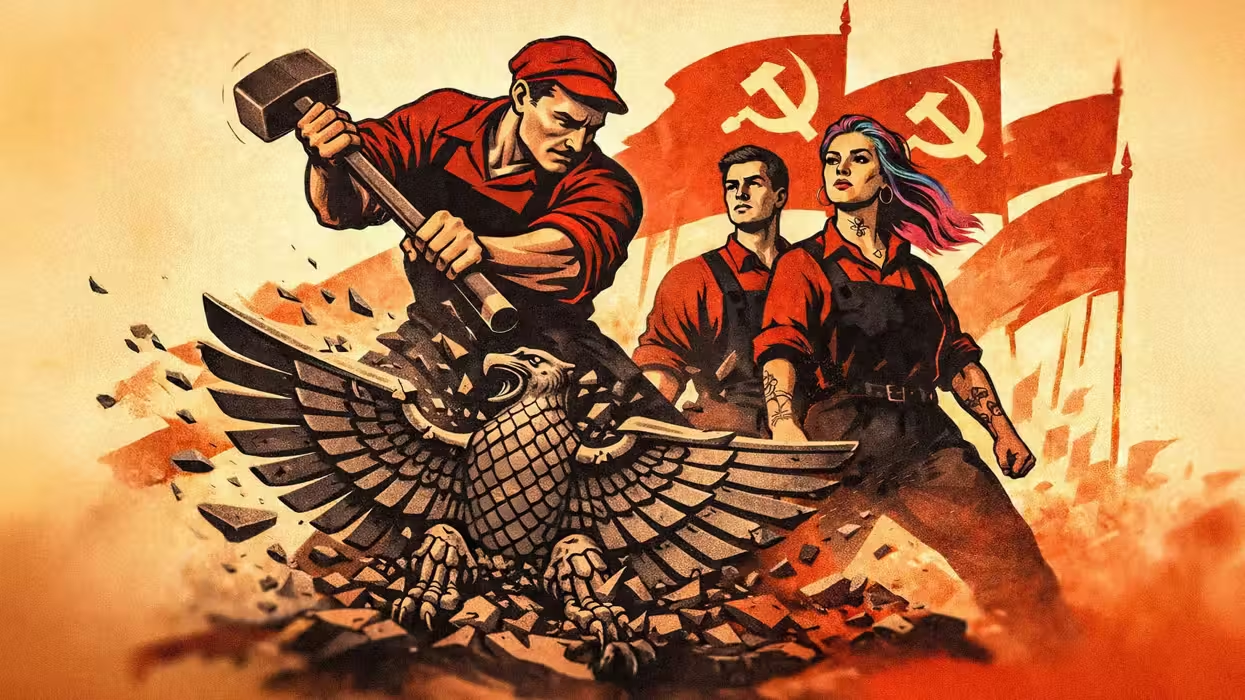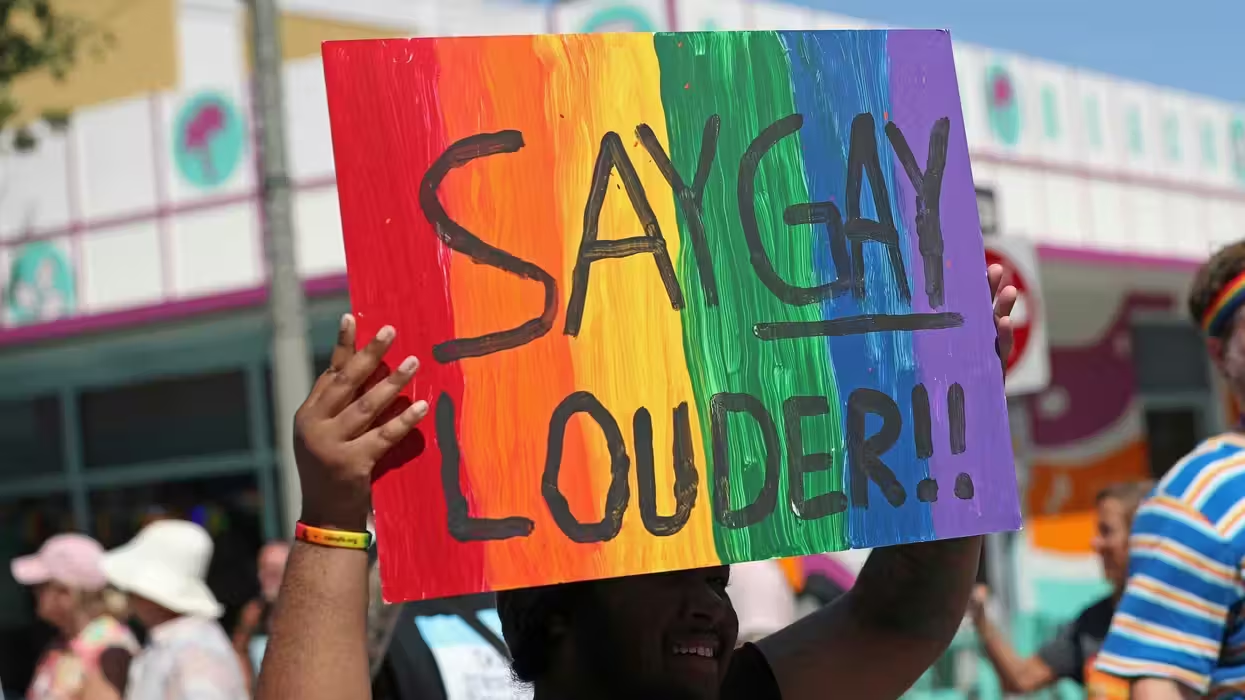
© 2025 Blaze Media LLC. All rights reserved.
The following is an excerpt from a new title that Glenn Beck has described as game-changing, Stephen Mansfield's "Mansfield's Book of Manly Men: An Utterly Invigorating Guide to Being Your Most Masculine Self," pages 15-21.
Be sure to check out mansfieldsbookofmanlymen.com for much much more!

Men are in crisis. We know this. There are books about it, seminars about it, retreats about it, academic conferences about it, and every kind of gathering where men sit around and talk about it. As these words are being written, men lag behind women in nearly every measurable field of achievement. If the statistics are true, and if television commercials are any reflection, men today are unhappy, self-loathing, pleasure-addicted, juvenile, and less productive than ever.
Three recent book titles tell the tale. One of them, and it is a major book by a serious author and a very serious publisher, is called Is There Anything Good About Men? Another, by a legendary sociologist, is entitled The Demise of Guys. The third? The End of Men: And the Rise of Women.
It makes you want to weep.
There are many reasons for this crisis of manhood in our time, but I do not plan to spend much time describing them. It is not what we are here to do. It is also where a great many books and men’s programs go wrong. They describe and analyze, mistaking conversation for meaningful change. They substitute words for action. It hasn’t worked.
Please don’t misunderstand me. I am not against words. I’ve written several dozen books myself. I’m also not against scholarship and cultural analysis. Both are part of what I do. Nor am I anti-intellectual. We need more serious thinking in our world, not less. We just do not need thought as a substitute for action. It’s killing us. ----
Someone once tried to summarize a principle in Aristotle’s epic work Poetics with these words: “Action is character.” Now Aristotle was describing the elements of drama when he wrote his Poetics, so he didn’t necessarily mean what I mean here. Still, his basic premise is true: we know what a person’s character is by what he does. I’m saying exactly the same thing, but I’m not referring to what happens on a stage. I’m referring to the life of a man.
I believe something fairly radical: true manhood comes from doing manly deeds. It is the mastery of a body of behaviors.
By words like manly and manhood, I don’t mean the kind of behavior we see in the fake masculinity that surrounds us today. There’s nothing manly about a guy downing booze until he throws up in the street. There’s nothing manly about cruising for women like some predatory beast and then devouring them for pleasure before casting them aside. There’s nothing manly about making a child but then running like a coward before that child is born. There’s nothing manly about dominating a woman or treating her like a servant or leaving her with burdens that aren’t rightly hers.
To think these actions make up true manhood is like thinking the average “gentlemen’s club” is actually for gentlemen. It’s not. Instead, it is a Palace of Perpetual Adolescence where incomplete males go to get on the cheap what they don’t have the guts to fight for righteously and make their own.
Even the legitimate pleasures that men traditionally enjoy don’t necessarily make them men. There certainly isn’t anything uniquely manly about watching sports or smoking cigars or venturing into the wild or wearing the latest cut of suit or downing great gobs of food. None of these are inherently evil—I do all of them from time to time!—but none are inherently masculine, either.
Let’s get this straight: none of this defines the kind of manhood I’m talking about here. I’m talking about the kind of manhood lived by bold, caring, principled, passionate men. I’m talking about the kind of manhood that makes a family whole, a woman safe, a child confident, and a community strong. I’m talking about a manhood rooted in heritage and honor and devotion to tribe. It is often rowdy and eager for fun, but it is always on duty and never fails to mind the borders of the territory it is assigned.
It is true, of course, that manhood like this usually grows from certain beliefs. But our society has discussed values and beliefs unceasingly. We’ve been like the football team that sits in the locker room and talks about how badly they are going to decimate the other team, but then never leaves the locker room to play the game. That locker room sure is a great place to hang out and talk smack! But it isn’t the game. It isn’t taking the field. That requires action.
Unfortunately, most of modern manhood is perpetually hanging out in the locker room—and talking, ever talking. Ultimately, though, you only know who a man is and what he believes by what he does. Not by what he sits around talking about. Not by what he says he feels. It’s only when he acts—when he does something—that we start to know what he is.
Action is character. Manhood is action.
Some people are going to be uncomfortable with this conclusion. They’ll want to say that true manhood comes from something else. A man becomes a true man by recovering his natural wildness. Or a man becomes a true man after he finds healing for his masculine soul. Or a man becomes a true man when he starts to resist being over domesticated. Or a man becomes a true man by being like Jesus. Or Gandhi. Or Bono.
There is some truth in all of this.
Afterward, though—after the man starts following Jesus, or is liberated, or is healed, or is unleashed—how do we know he is a true man? We know only if he acts like one. If he behaves the way we know a man ought to behave. If he does the things men do.
The great mistake we have made in our generation is to think we can make a man with words. We need words, certainly. We just don’t need words only. Yet by making words our primary tool in building men, we’ve talked the modern man to death. He is awash in a sea of words. He has language for things he hasn’t even thought about doing—labels from a dozen therapeutic systems, lists and descriptions, and nifty slogans to keep him inspired. Fine. But has it made him a man? Has it made him act in noble, manly ways? Not usually. I think it has bored him to death. Or, worse, it has made him feel like a victim. Or, worse than that, it has made him feel understood, as though being understood is the meaning of life.
Here’s the question: When does he start the doing? When does he act?
I think the more talk, the less action. I think the more drama, the less manhood. I also believe that the more talk, the more complex and unattainable manhood starts to seem to most men, particularly since the average man doesn’t need that many words to begin with— on any subject!
Hear me, gentlemen: true men do things—manly things. Mere males who want to seem like men just talk. Manhood is in the doing.
There is a video on YouTube that I watch from time to time to remind me of this truth. As the video begins, a crowd has formed a circle at a sports facility and within that circle two fighters face each other. They have boxing gloves on, but you can tell they are about to engage in full-contact fighting. Both fighters warm up by doing great, arcing back kicks and impressive punch combinations. You inch up in your seat. You can tell this is going to be good.
The referee introduces the men and signals the start of the fight. One of the fighters is an impressive athlete. He keeps doing a type of forward, midair rotating kick that sends the crowd into delirium. He spins and spins. He’s like a human rotor daring his opponent to step into the blades of his finely honed skills.
The other fighter looks to be in good shape, too, but he just bounces and jabs the air like every other fighter we’ve ever seen. You are pretty sure the first guy is going to kill this second guy, though.
Even after the referee signals the start, that first fighter keeps putting on a display of his spinning skill. He’s amazing. The second fighter just watches, bounces and jabs the air.
Finally, as the first fighter is just in a spinner’s mania, the crowd out of its mind with excitement, the second fighter takes two steps forward into the rotors and lands a punch on the other man’s head just as that head is coming up from a spin. And the punch knocks our spinning fighter out cold. The second man waits a moment to be sure Blades of Death is really down for good. He is. Our second fighter then makes the universal “I Won/Touchdown” signal—both hands raised straight up into the air—and walks off. The fight is over.
Now that first fighter was an amazing athlete. He could sure spin. He forgot, though, that fighters are supposed to fight. Dancing doesn’t win fights. Fighting does.
I think it is the same with men. To be a man, you have to do man things. You can do other things, even woman things, but you won’t be a man. A man does the things men do. It’s how we know he is a man. It’s how we benefit from what it means for him to be a man.
Want to leave a tip?
We answer to you. Help keep our content free of advertisers and big tech censorship by leaving a tip today.
Want to join the conversation?
Already a subscriber?
Ben Weingarten is a writer, commentator, and editor at large at RealClearInvestigations. He is a senior contributor at the Federalist and writes columns for Newsweek and the Epoch Times.
Ben Weingarten
Ben Weingarten is a writer, commentator, and editor at large at RealClearInvestigations. He is a senior contributor at the Federalist and writes columns for Newsweek and the Epoch Times.
more stories
Sign up for the Blaze newsletter
By signing up, you agree to our Privacy Policy and Terms of Use, and agree to receive content that may sometimes include advertisements. You may opt out at any time.
Related Content
© 2025 Blaze Media LLC. All rights reserved.
Get the stories that matter most delivered directly to your inbox.
By signing up, you agree to our Privacy Policy and Terms of Use, and agree to receive content that may sometimes include advertisements. You may opt out at any time.






